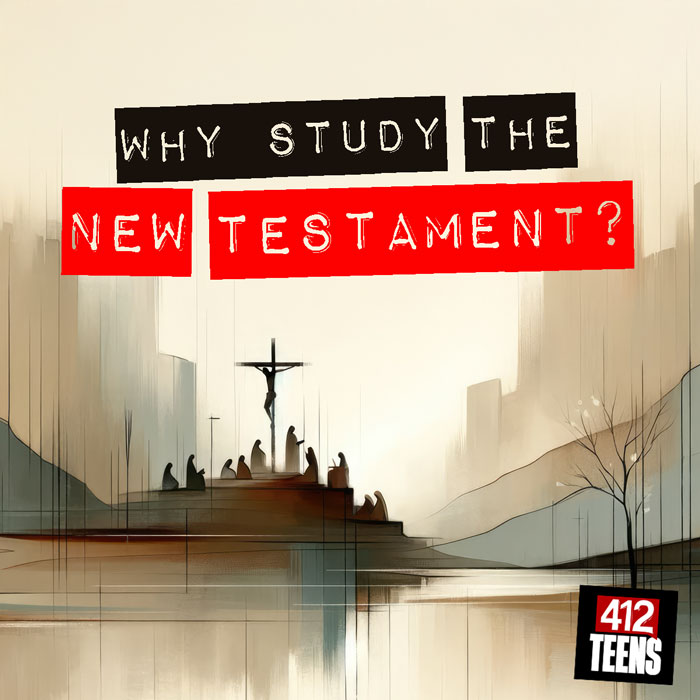Why should we study the New Testament?

The books of the Bible are split into two major parts: the Old Testament and the New Testament. The Old Testament includes 39 books, and the New Testament includes 27 books. These two sections are like two-sides of the same coin. Each has a specific message, but the teaching is interrelated.
So both parts are needed to fully understand the revelation of the Bible as a whole. The Bible is considered a "progressive" revelation, which means that God revealed His plan bit by bit, over time, starting in the Old Testament and finishing in the New Testament. Both are important to study, but let's consider some specific reasons for reading the New Testament.
Reason #1: Biblical Understanding
One of the key reasons to study the New Testament is to gain a fuller understanding of the Bible as a whole. The word "testament" literally means "contract" or "covenant." A covenant is an agreement between two parties, so the Bible explains the two covenants God made with humanity. The Old Testament focuses on the covenant that God made with His chosen people, Israel (Exodus 24:8). The New Testament talks about the covenant that went into effect with the arrival of Jesus.
The Old Covenant
This first covenant was governed by a law that prescribed correct, moral behavior, as outlined by God. Whenever Israel broke the law (and they did A LOT), there was a specific way they could be reconciled with God. This involved regular sacrifices of innocent lambs as a payment for their sin, because sin can only be paid through the shedding of blood (Leviticus 4:35, 5:10; Hebrews 9:22; Romans 6:23).
In many ways, the Old Testament leaves us hopeless. As history has proven, humanity could never perfectly keep a moral law. Studying the New Testament, however, brings us new hope. Right within the first four books of the New Testament, we are presented with a solution to our sin problem through God's grace—a Savior from the punishment of sin (John 3:16-17; Romans 5:8).
The New Covenant
"For while we were still weak, at the right time Christ died for the ungodly. For one will scarcely die for a righteous person—though perhaps for a good person one would dare even to die—but God shows his love for us in that while we were still sinners, Christ died for us. Since, therefore, we have now been justified by his blood, much more shall we be saved by him from the wrath of God." —Romans 5:6-9
When Jesus came, He did not do away with the Old Covenant. He perfectly fulfilled humanity's contract with God by providing a final, sinless human sacrifice that would cover the sins of every human for all time (Romans 6:9-10; 1 Peter 3:18). Then He presented a new covenant (Matthew 5:17, Hebrews 10:11-14).
"[Jesus] is the mediator of a new covenant, so that those who are called may receive the promised eternal inheritance, since a death has occurred that redeems them from the transgressions committed under the first covenant." —Hebrews 9:15

All 27 books of the New Testament explain this new covenant in detail—how it came to be, how it works in daily life, and how it will manifest at the end of time. The first four books are called the Gospels. These books contain details about Jesus' birth, life, ministry, miracles teaching, death, and resurrection. Jesus is the final and ultimate sacrifice.
"John saw Jesus coming toward him and said, 'Look, the Lamb of God, who takes away the sin of the world!'" —John 1:29
In the Old Testament, there are over 300 prophecies, or predictions, about Jesus that all came true, and the New Testament records the fulfillment of those prophecies. Reading about their precise fulfillment helps us know that the Bible is truly God's Word (2 Timothy 3:16-17) and that Jesus is God—because this could not happen by chance or from the acts of any human.
Additionally, when you study the New Testament, you gain a fuller understanding of the concepts written in the Old Testament concerning events, characters, laws, sacrificial systems, covenants, promises, etc.
Reason #2: To Know the Heart of God
When Jesus tells His disciples that He's about to leave this earth, one of them asks for Jesus to show their Heavenly Father to them before He leaves. To this, Jesus replies that anyone who has seen Jesus had also seen the Father (John 14:9). Jesus is God in the flesh (John 1:14)—both human and God. So when we study the New Testament, we'll gain a better understanding of who God is.
Sometimes, when we read the Gospels and see directly how Jesus related to others, it helps us see the heart of God in a more tangible, practical way. Jesus wept with those He loved (John 11:33-36), forgave sinners and healed the sick (Mark 2:5-12), cared for widows (Luke 7:112-16), and strengthened the faith of the weak (Matthew 14:30-33). By studying the heart of Jesus in the New Testament, we clearly see the attributes of God at work and His love for us still today.
Reason #3: Practical Application
In the New Testament, there's a lot of practical application about what it means to be a follower of Christ, which is important to help us understand how best to live our lives for God's glory.
The book of Acts records what happened right after Jesus ascended into Heaven, plus the events of the early Church. This book records how Jesus' disciples went out into Jerusalem, Judea, Samaria, and to the ends of the earth (Acts 1:8) to preach the message of salvation through Jesus.
During the time of Acts, a man named Saul (who was also called Paul) was actively persecuting Christians, believing they were heretics. Jesus appeared to him while he was traveling between cities and caused a radical transformation in Saul's heart (Acts 9:1-31). Saul then went from arresting and killing Christians to believing in Jesus himself. He was quickly persecuted for preaching the Gospel of Christ. The book of Acts inspires us be courageous when enduring suffering for the name of Christ.
Saul started going by his other name, Paul, and wrote 13 books/letters (Romans through Philemon) that were included in the New Testament. Other books, Hebrews through Jude, are called the General Epistles, and were written by various authors to bolster and strengthen the early church.
These are important theological writings that explain many doctrinal concepts and applications of the New Covenant. For example, how we are dead to the law and sin through Jesus (Romans 7:4), made new creations in Christ (2 Corinthians 5:17), and commanded to "put off" things like anger, slander, and filthy language and "put on" compassion, humility, and forgiveness (Colossians 3:8, 12-13). There's also specific teaching for couples, parents, children, employers, employees, and church leadership.
Reason #4: To Know the End
The last book of the New Testament is Revelation. This book is a vision written down by the Apostle John about the tribulation at the end of the world, the final judgment of Satan and those who rejected Jesus, and God's utmost kingdom in the new Heaven and new earth, which He will share with those who believe in Jesus as their Savior.
When we study the New Testament, we discover what the end of time will be like. This ought to give believers hope of their coming eternal life and encourage us to share the gospel with those who are not saved so that they will believe in Jesus and avoid the final judgment and instead experience joy in Christ.
The New Testament was written from approximately 45 to 95 AD. Although it was written around 2,000 years ago, there are still many reasons for reading it today—from gaining a fuller understanding of the Bible to practical applications to your life. What do you think? Are you ready dive in?
"All Scripture is breathed out by God and profitable for teaching, for reproof, for correction, and for training in righteousness, that the man of God may be complete, equipped for every good work." —2 Timothy 3:16-17
ALSO SEE:
- What is the Bible?
- How old is the Bible?
- Why does the Bible have four gospels?
- Why should we study the Old Testament?
- What are some different ways to study the Bible?
- Why should we read the Bible?
- What parts of the Bible apply today?
- Is the Bible relevant for today?
- Where should I start reading in the Bible?
- How can I get excited reading the Bible?
- Is the Bible a reliable record of the original manuscripts?
- Why isn't the Bible in chronological order?
- Why is it important to study Bible characters?
- What is salvation?
- Are all my future sins already forgiven?
- What do BC and AD stand for?
- Can you read the whole Bible in 2 weeks? (from Hanna's discipleship site)


TL;DR
The New Testament is the second major section of the Bible and was written from approximately 45 to 95 AD. This collection of books and letters gives details about the new covenant between God and humanity. This covenant is based on Jesus and how He perfectly obeyed the law, qualifying Him to be our ultimate sacrifice for sin; salvation is only through Him. Although God's Word was written around 2,000 years ago, there are still many reasons for reading it today—from gaining a fuller understanding of the Bible to practical applications to your life (2 Timothy 3:16-17).

Writer: Hanna S.
Hanna loves spending time with kids and teens. She enjoys being detectives with them to investigate God's Word to discover truths to answer any questions. She is the co-author of a newly published apologetics curriculum for children and teaches one online for highschoolers-adults. To learn more about her ministry you can visit networkerstec.com. For fun, she likes to play Ultimate Frisbee, read historical fiction, and paint.
